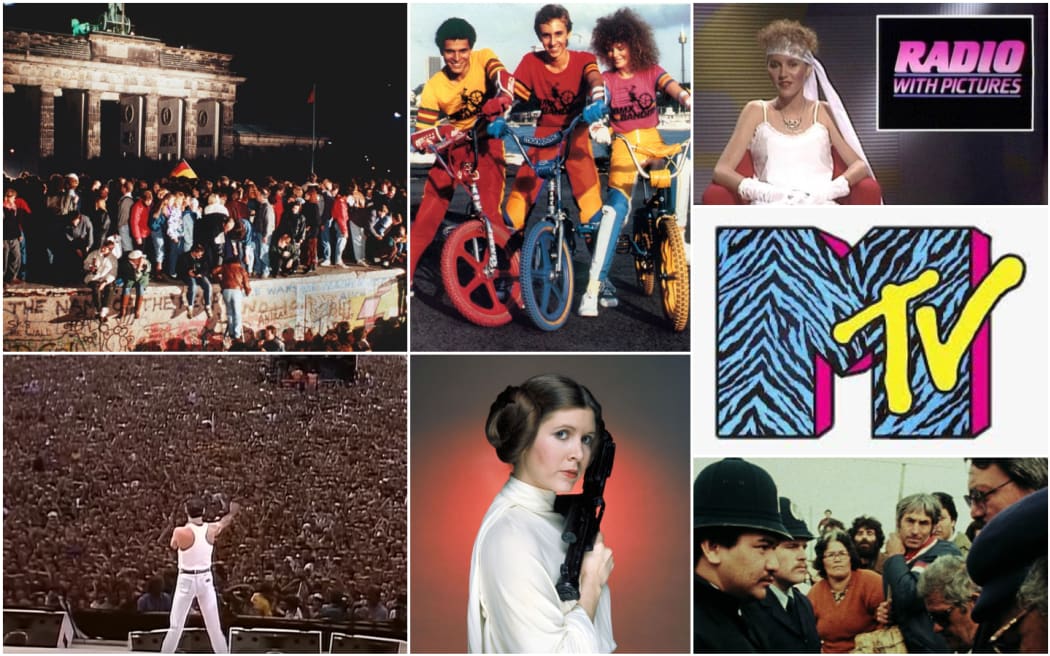The fall of the Berlin Wall, the Bastion Point protest, MTV and Star Wars are all cultural touchstones for Gen X. Photo: AFP/Supplied
题图:柏林墙的倒塌、堡垒点抗议活动、MTV 和星球大战都是 X 世代的文化试金石。
Explainer – You’re probably familiar with Boomers and Millennials, but unless you fall into the age group in the middle, you probably haven’t heard much about Generation X.
【澳纽网编译】解说 – 你可能熟悉婴儿潮一代和千禧一代,但除非你属于中间年龄组,否则你可能没有听说过太多关于X世代的事情。
But with a major exhibition of work by Gen X artists about to open at Te Papa, this might be about to change.
但是,随着X世代艺术家的大型作品展即将在Te Papa开幕,这种情况可能即将改变。
广告 | Advertisement
在澳纽网做广告 | Advertise with us
Generation X, now aged between 44 and 59, grew up at a time of major societal and economic change.
X世代的年龄在44至59岁之间,成长于社会和经济发生重大变革的时期。
Dr Lorena Gibson, a senior lecturer at Victoria University’s School of Social and Cultural Studies (and herself a member of Generation X) explains what this means.
维多利亚大学社会与文化研究学院的高级讲师Lorena Gibson博士(她本人也是X世代的一员)解释了这意味着什么。
Who fits into Generation X?
谁适合X世代?
Generation X is made up of people born between 1965 and 1980. The oldest Gen Xs are turning 60 next year, while the youngest ones are 44 this year.
X 世代由 1965 年至 1980 年间出生的人组成。最年长的X世代明年将满60岁,而最年轻的X世代今年将满44岁。
What are the other generations?
其他几代人是什么?
There are a handful of generations defined by name. The label ‘Baby Boomers’ refers to those born between 1946-1964 and Millennials are those born between 1981-1996. Gen Z are those born between 1997-2012, and Gen Alpha currently make up our youngest generation; encompassing all those born between 2010-2024.
有几代人由名字定义。“婴儿潮一代”是指1946-1964年之间出生的人,千禧一代是指1981-1996年之间出生的人。Z 世代是 1997 年至 2012 年之间出生的人,而 Alpha 世代目前构成了我们最年轻的一代;包括 2010 年至 2024 年之间出生的所有婴儿。
广告 | Advertisement
在澳纽网做广告 | Advertise with us

Donald Trump is a Boomer, former All Black Tana Umaga is Gen X, and Taylor Swift is a Millennial, while Kamala Harris is Generation Jones, former All Black Dan Carter is a Xennial and singer Sabrina Carpenter is a Zillenial. Photo: RNZ / AFP / Supplied
唐纳德·特朗普是婴儿潮一代,前全黑塔娜·乌马加是 X 世代,泰勒·斯威夫特是千禧一代,而卡玛拉·哈里斯是琼斯一代,前全黑丹·卡特是 X 世代,歌手萨布丽娜·卡彭特是 Z世代。照片:RNZ / AFP / 提供
There are also micro-generations, which refer to groups of people born on the cusp of two major generations; Generation Jones (1954-1965), Xennials (1977-1983), and Zillennials (1990-2000). The current Covid Generation are young people whose lives have been significantly impacted by the pandemic.
也有微世代,指的是出生在两代主要世代的风口浪尖上的人群;琼斯一代(1954-1965),X世代(1977-1983)和Z世代(1990-2000)。当前的 Covid 一代是年轻人,他们的生活受到大流行的严重影响。
Informally, groups have also been formed around major cultural events, Gibson says.
吉布森说,非正式地,围绕重大文化活动也成立了团体。
“There’s the Star Wars generation, people who grew up when the original Star Wars trilogy was released between 1977 and 1983, or the old hip-hop generation, there’s iGen, the first generation of people to go through adolescence with smartphones, and the YouTube generation.”
“有《星球大战》一代,在1977年至1983年原版《星球大战》三部曲上映时长大的人,或者是老嘻哈一代,有iGen,第一代用智能手机度过青春期的人,还有YouTube一代。
广告
Advertise with us
Where do these labels come from?
这些标签从何而来?
Generations were first theorised by German sociologist Karl Mannheim and Spanish philosopher Jose Ortega y Gasset in the 1920s and 1930s, but they really took off in popularity in the late 1940s following the great baby boom post-World War II.
德国社会学家卡尔·曼海姆(Karl Mannheim)和西班牙哲学家何塞·奥尔特加·加塞特(Jose Ortega y Gasset)在1920年代和1930年代首次将世代理论化,但在1940年代后期,随着二战后的婴儿潮,世代真正开始流行。
“In the United States they started using the term ‘Baby Boom’ to describe the soaring birth rates that happened after WWII,” Gibson says.
“在美国,他们开始使用’婴儿潮’一词来描述二战后出生率的飙升,”吉布森说。
“Since then, all sorts of social scientists, sociologists, psychologists, anthropologists, as well as journalists and writers, often in the United States, have used the generations as a way to understand social change and cultural differences between people in different age groups; they’ll use it to write about things like youth culture, the generation gap, generation tech, and the digital divide.”
“从那时起,各种各样的社会科学家、社会学家、心理学家、人类学家,以及记者和作家,往往在美国,都利用世代相传来理解不同年龄组的人之间的社会变革和文化差异;他们会用它来写关于青年文化、代沟、科技和数字鸿沟等内容。
What are the tropes attached to Gen X?
X世代的比喻是什么?
These generational labels are used as a way of understanding and explaining a group of people who have a shared journey through major historical, social, economic, political and technological events. Some of the key tropes applied to Gen X include ‘the middle children’, the ‘Slacker Generation’, and the ‘Forgotten Generation’.
这些代际标签被用作理解和解释一群人在重大历史、社会、经济、政治和技术事件中有着共同的旅程的一种方式。应用于 X 世代的一些关键比喻包括“中间的孩子”、“懒惰的一代”和“被遗忘的一代”。

Dr Lorena Gibson: “Music was huge, it was a way we could find our people through a shared love for punk or grunge or hip hop, as well as music festivals.” Photo: Jechtography
Lorena Gibson博士说:“音乐是巨大的,它是一种方式,我们可以通过对朋克、摇滚或嘻哈的共同热爱,以及音乐节来找到我们的人民。照片:Jechtography
广告 | Advertisement
在澳纽网做广告 | Advertise with us
“Gen Xs are assumed to have shared characteristics or personality traits because of the time we grew up in,” Gibson says.
吉布森说:“由于我们成长的时代,X世代被认为具有共同的特征或性格特征。
“Sarcasm, being slackers, there’s quite a few tropes that float around on social media, one I’ve seen around lately is ‘latchkey kids’ – we’re the generation who walked to and from school by ourselves and let ourselves in when we got home after school with our own latchkey, or it might’ve been left under the flower pot because no one else was home. We watched TV, we made our own food because our parents were out working.
“讽刺,作为懒惰者,社交媒体上流传着很多比喻,我最近看到的一个是’闩锁孩子’——我们是自己走路上下学的一代,当我们放学回家时带着自己的闩锁让自己进来,或者它可能被留在花盆下面,因为没有其他人在家。我们看电视,自己做饭,因为我们的父母外出工作。
“We also used to run around the streets at all hours and our parents didn’t know where we were, because we didn’t have cellphones, and no one could contact us. This apparently made us tough and resilient, although also perhaps left us feeling a little uncared for.
“我们也经常整天在街上跑来跑去,我们的父母不知道我们在哪里,因为我们没有手机,也没有人能联系到我们。这显然使我们变得坚韧和有弹性,尽管也可能让我们感到有些无人关心。
“The ‘Forgotten Generation’ label comes from feeling kind of squished in between the Baby Boomers and Millennials who can make quite a bit of noise.”
“’被遗忘的一代’的标签来自于婴儿潮一代和千禧一代之间的感觉,他们可以制造相当大的噪音。
Do these labels or tropes exist outside of Western culture?
这些标签或比喻是否存在于西方文化之外?
Gibson says the labels aren’t universal – and they aren’t always helpful within Western concepts either.
吉布森说,这些标签并不是通用的,而且它们在西方概念中也并不总是有帮助。
“If we think of America, for example, someone born in July 1972 to a white family in San Francisco will have a different life experience to someone born on the same day to a Black family in rural Texas, and to someone born on the same day to a Kānaka Maoli family on the big island of Hawai’i.
“例如,如果我们想到美国,一个1972年7月出生于旧金山白人家庭的人,将与同一天出生在德克萨斯州农村一个黑人家庭的人,以及同一天出生在夏威夷大岛的卡纳卡毛利人家庭的人,有着不同的生活经历。
“They’re all Gen Xs and they all might have gone through those same big events, but differences in gender, ethnicity, class, where they live, how they came to be there, those kinds of things can make the kind of sweeping generalisations that go along with generations a bit meaningless.”
“他们都是X世代,他们可能都经历过同样的大事件,但是性别、种族、阶级、他们住在哪里、他们是如何来到那里的差异,这些事情可能会使那种与几代人相伴的笼统的概括变得有点毫无意义。
广告 | Advertisement
在澳纽网做广告 | Advertise with us
What are the key events that have shaped Gen X?
塑造 X 世代的关键事件是什么?
Early to mid-Gen X were teens at the fall of the Berlin Wall and grew up under the shadow of AIDS and nuclear war. They were the last generation to grow up without the internet, and the first to experience music television channels like MTV.
X世代早期到中期是柏林墙倒塌时的青少年,在艾滋病和核战争的阴影下长大。他们是在没有互联网的情况下长大的最后一代人,也是第一个体验 MTV 等音乐电视频道的人。
Gibson says many of her memories growing up revolved around music.
吉布森说,她成长过程中的许多记忆都围绕着音乐。

Queen’s Freddie Mercury performs at Live Aid in 1985. Photo: Norbert Forsterling / DPA / dpa Picture-Alliance via AFP
1985 年,女王乐队的弗雷迪·默丘里 (Freddie Mercury) 在 Live Aid 上表演。照片:Norbert Forsterling / DPA / dpa Picture-Alliance via AFP
“The Ethiopian famine of the early 1980s led to the Live Aid music concert and that hit song ‘We Are The World’ by USA for Africa, and there was the 40 Hour Famine I did at school, that was a major event that came home here to Aotearoa.
“1980 年代初的埃塞俄比亚饥荒导致了 Live Aid 音乐会和美国为非洲创作的热门歌曲《We Are The World》,我在学校做了《 40 Hour Famine》,这是一个重大事件,回到了新西兰的家乡。
“Another moment for me was the move from analogue to digital, and all of those technological developments and the global flows of media and music and consumer goods; I remember getting my first Walkman cassette player, I remember listening to Casey Kasem and Rick Dees Weekly Top 40 on the radio, definitely watching MTV and Ready to Roll.
“对我来说,另一个时刻是从模拟到数字的转变,以及所有这些技术发展以及媒体、音乐和消费品的全球流动;我记得我买了我的第一台随身听盒式磁带播放器,我记得在收音机里听 Casey Kasem 和 Rick Dees Weekly Top 40,肯定在看 MTV 和 Ready to Roll。
“Music was huge, it was a way we could find our people through a shared love for punk or grunge or hip-hop, as well as music festivals.
“音乐是巨大的,这是我们通过对朋克、垃圾摇滚或嘻哈以及音乐节的共同热爱找到我们的人民的一种方式。
“Then there were big events like the Gulf War, the Cold War, the rise of the internet, the economic recessions of the 1980s and 1990s.
“然后是海湾战争、冷战、互联网的兴起、1980 年代和 1990 年代的经济衰退等重大事件。
“Here in Aotearoa some key events that shaped us include Bastion Point, the Dawn Raids, the 1981 Springbok Tour, the sinking of the Rainbow Warrior and calls for a nuclear-free New Zealand, so I guess if I was going to try and characterise us, I would maybe say we have a sense of activism, advocacy for social justice, and the idea that the world could be a better place than what it is.
“在新西兰,一些塑造我们的关键事件包括堡垒点、黎明突袭、1981 年跳羚之旅、彩虹战士的沉没以及呼吁新西兰无核化,所以我想如果我要描述我们,我可能会说我们有一种激进主义的感觉,倡导社会正义, 以及世界可以比现在更好的地方的想法。
“Student loans were also introduced for us, so I got saddled with a lot of debt very quickly which I am still paying off today. It’s been a huge impact on Gen X, I would say.”
“我们还为我们引入了学生贷款,所以我很快就背负了很多债务,我今天仍在偿还。我想说,这对X世代产生了巨大的影响。
广告
Advertise with us
What do Gen X get nostalgic about?
X世代怀旧什么?
Gen X were one of the last generations to grow up without easy access to the Internet. Gibson remembers spending her childhood roaming freely without distractions – and later, the feeling of getting her first cellphone.
X世代是最后一代人之一,他们在没有轻松访问互联网的情况下长大。吉布森记得她的童年是在不受干扰的情况下自由漫游度过的——后来,她有了第一部手机的感觉。
“I was in my early 20s and it was very exciting. I remember what it was like to grow up without a cellphone and internet at home, and how big it was when things like AOL instant messaging came along, the big decision you had to make about what you wanted your Hotmail email address to be, your username on Myspace, those kinds of things.
“我当时20岁出头,这非常令人兴奋。我记得在家里没有手机和互联网的情况下长大的感觉,当像AOL即时通讯这样的事情出现时,它有多大,你必须做出的重大决定,关于你希望你的Hotmail电子邮件地址是什么,你在Myspace上的用户名,诸如此类的事情。

Olly Ohlson presented kids TV show After School for six years in the 1980s. Photo: NZ On Screen
奥利·奥尔森 (Olly Ohlson) 在 1980 年代推出了六年的儿童电视节目《放学后》。照片:NZ On Screen
“I remember Olly Ohlson on the TV very clearly, there was also a question of who in your family was the remote control, because they would have to get up and change the channel on the TV. I remember shows like Fraggle Rock and Alf, they seemed to be big on puppets that era.
“我非常清楚地记得电视上的奥利·奥尔森(Olly Ohlson),还有一个问题,那就是你家里谁是遥控器,因为他们必须站起来改变电视上的频道。我记得像 Fraggle Rock 和 Alf 这样的节目,他们似乎在那个时代对木偶很感兴趣。
“And there were these public service announcements in the US throughout the whole Gen X era from the mid-1960s to the late 1970s; these ads would come on television or be read on the radio late in the evening, ‘Do you know where your children are?’ to prompt parents to take their parental responsibilities and to go and look for their children who would be out doing whatever.”
“从 1960 年代中期到 1970 年代后期的整个 X 世代时代,美国都有这些公共服务公告;这些广告会在电视上出现,或者在深夜在广播中播放,’你知道你的孩子在哪里吗?’,以促使父母承担起父母的责任,去寻找他们的孩子,他们会在外面做任何事情。
Generation X: 50 Artworks from the Chartwell Collection opens at Te Papa on 27 July and runs until 20 October.
“X世代:查特韦尔收藏的50件艺术品”将于7月27日在蒂帕帕(Te Papa)开幕,展期至10月20日。
来源:RNZ
分类: 澳纽资讯
(即时多来源) 新西兰英语新闻 New Zealand English News
广告 | Advertisement
在澳纽网做广告 | Advertise with us
5,622 views






